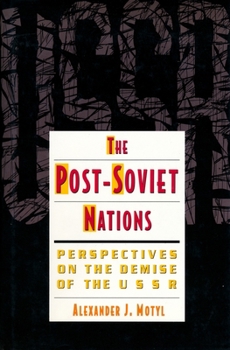The Post-Soviet Nations: Perspectives on the Demise of the USSR
Select Format
Select Condition 
Book Overview
How must Sovietology change as a result of the Soviet Union's collapse? Motyl and his colleagues suggest that the first step in reorientation of the field must involve recognizing the non-Russians and their republics as central to both Soviet politics and to the post-Soviet reality.
Format:Paperback
Language:English
ISBN:0231078951
ISBN13:9780231078955
Release Date:November 1995
Publisher:Columbia University Press
Length:321 Pages
Weight:0.95 lbs.
Dimensions:0.8" x 6.0" x 9.0"
Age Range:22 years and up
Grade Range:Postsecondary and higher
Customer Reviews
1 rating
Throws some light on the processes of change in the USSR
Published by Thriftbooks.com User , 26 years ago
Reviewed by VICTOR B. KIRILLOV in International Relations, Volume XIII, No 1, April 1996. This is a transitional volume consisting as it does of two realities, one that was and one that is about to be. It is the result of a research project headed by A. J. Motyl under the auspices of Columbia University's W. Averell Harriman Institute for the Advanced Study of the Soviet Union. The book's aim is to throw some light on the processes of change in the USSR through a systematic analysis of the main thematic determinants of the national factor within the Soviet Union. The authors pay a great deal of attention to the modern stage of Sovietology and perspectives of its development. In their view, a thorough study of the post-Soviet nations and their new states is needed, since their role in the dramatic collapse and drastic changes of the USSR is important. With the help of historical and analytical research methods, these twelve well-known political scientists attempt to illuminate certain lacunae of the national question in the former USSR. G. Gleason devotes his chapter to an analysis of the national factor in connection with the development of Soviet studies. He notes that the Soviet experiment would not only fail to eliminate national enmity in terms of class-based brotherhood but would also itself become the victim of ethnic discord. Gleason believes that the collapse of the economic policy based on total centralism and the denial of private property was one of the main reasons for the reorganizing process in the USSR. The natural disappearance of class values was another reason. Under those conditions, nationalism was the only means of mass mobilization. As a rule, in such cases, any process develops in the following way: multiformity - nationalism - national self-determination - democracy - freedom for the people. However, the author thinks that all processes within the former Soviet Union developed in a much more complicated manner. It would, therefore, be wrong to use this scheme for post-Soviet nations. He also gives a short sketch of the main periods in the development of Soviet studies. The author criticizes some of its drawbacks, in particular, the absence of interest in the concerns of local and national groups. Walker Connor analyses the ideological, economic, social and cultural aspects of Soviet policy toward non-Russian peoples, from Lenin to Gorbachev. Examining the evolution of the multinational state, the author notes that there was a wide discrepancy between the theory of official declarations on complete national equality within the Soviet Union and practice. Strategic considerations were given the highest priority when allocating investment goods. Although living standards improved substantially in the Asian sector as a result of the policy of economic equality of all nations and people, there were huge discrepancies between the European and Asian sectors. Since the 1930s cultural policy actively encouraged the spread of the Rus






